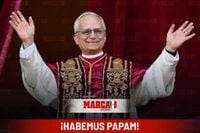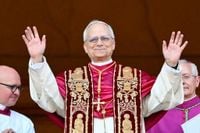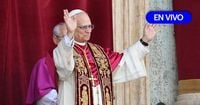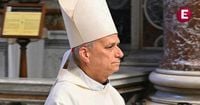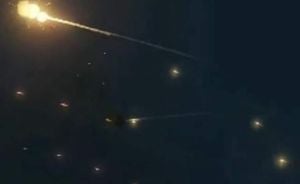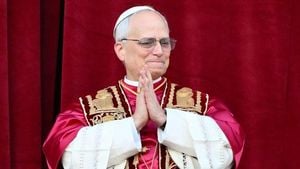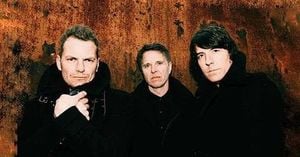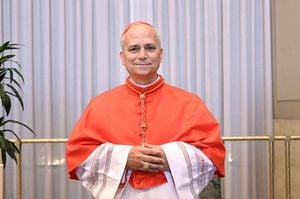The Catholic Church has a new Pope: Cardinal Robert Prevost, elected today, May 8, 2025, by 133 cardinals on the second day of the conclave following negotiations to choose the successor of Pope Francis, who passed away on April 21 at the age of 88. White smoke billowed from the chimney installed in the Sistine Chapel shortly after 10:00 AM Mexico time, announcing that the Church has a new leader who will continue its religious mission. The bells rang in Rome and across churches worldwide to announce the new pontiff.
After four rounds of voting, the cardinals reached a consensus and elected the 267th Pope of the Catholic Church, sparking jubilation among the thousands who gathered in St. Peter's Square for the second day, eagerly awaiting the decision of the religious leaders in the conclave.
Cardinal protodiacon Dominique Mamberti stepped out onto the balcony of St. Peter's Basilica and announced "Habemus papam," revealing that the new Pope is Cardinal Robert Prevost, born in Chicago, United States. Prevost, who has served as a missionary in his order, has significant experience in Latin America. He chose the name Leo XIV for his papacy and appeared on the balcony to impart his blessing "urbi et orbi" (to the city and the world).
Robert Prevost was born on September 14, 1955, and is now 69 years old. His journey in the Church began when he arrived in Peru as a young Augustinian missionary in 1985, just three years after his ordination as a priest. He returned in 1988 to lead the Augustinian seminary in Trujillo for a decade. In 2014, he returned to Peru as apostolic administrator of the Diocese of Chiclayo, later becoming bishop of that northern town.
With the election of Prevost, the Catholic Church sees its first American Pope, a significant milestone in its history. His dual nationality, having obtained Peruvian citizenship in 2015, further emphasizes the global nature of his papacy. Prevost is known for his moderate views and bridge-building approach, which will be crucial in a time when the Church appears deeply divided.
The conclave commenced on May 7, 2025, with a mass "Pro eligendo pontifice" and an initial voting round. However, after two rounds of black smoke, indicating no decision was reached, the cardinals finally made a decision on the afternoon of May 8. During the last century, the average number of votes needed to elect a pope has ranged from three to eight, with Pope Francis being elected in the fifth vote in 2013.
Once a candidate receives the necessary votes and accepts, they choose the name they will use as Pope and enter the "Sala de las lágrimas" (Room of Tears) to don the papal vestments. Shortly thereafter, they are presented to the world from the balcony of St. Peter's Basilica with the proclamation in Latin: "Annuntio vobis gaudium magnum: habemus papam!" (I announce to you a great joy: we have a Pope!).
In his first message to the faithful awaiting outside the Sistine Chapel, Prevost stated, "God loves us all unconditionally," expressing gratitude to his predecessor, Pope Francis, for his actions within the Church. He also greeted his former diocese in Chiclayo, Peru, in Spanish.
The election of Prevost comes at a time when the Church faces numerous challenges, including calls for reform and greater inclusivity. The conclave itself was marked by a historical record of geographic diversity among the cardinals, with participants from various regions of the world. This diversity reflects the global nature of the Church and the different perspectives that will influence the new papacy.
As the new pontiff, Leo XIV inherits a Church that is navigating complex issues, including social justice, environmental concerns, and the ongoing need for unity among its members. His past experiences in Latin America, where he has spent a significant portion of his life, may inform his approach to these challenges.
The conclave was held under strict secrecy, with cardinals required to take an oath of confidentiality. The vote count and discussions took place within the walls of the Sistine Chapel, where no outside communication was allowed. This process is designed to ensure that the election remains free from external influence and maintains the sanctity of the decision-making process.
While the election of a new pope is always a significant event in the Catholic Church, the election of an American pontiff carries additional weight, considering the historical context of the Church's leadership. The idea of an American pope had been dismissed for centuries due to geographical and political concerns, but Prevost's election signifies a shift in that narrative.
In the days leading up to the conclave, speculation about potential candidates was rampant. Cardinal Pietro Parolin, the Vatican's Secretary of State, was seen as a strong contender, along with other prominent figures such as Cardinal Luis Antonio Tagle from the Philippines. However, Prevost's election highlights the unpredictable nature of the conclave process and the complexities involved in reaching a consensus among the cardinals.
As the world awaits the new pope's first official acts and statements, many will be looking to see how Leo XIV will navigate the challenges ahead. His leadership style, shaped by years of pastoral experience and his commitment to building bridges, will be crucial in guiding the Church through a time of change and uncertainty.
In conclusion, the election of Robert Prevost as Pope Leo XIV marks a historic moment for the Catholic Church, as it embraces a new leader with a unique perspective and a wealth of experience. The faithful around the world look forward to his guidance and vision for the future of the Church.
